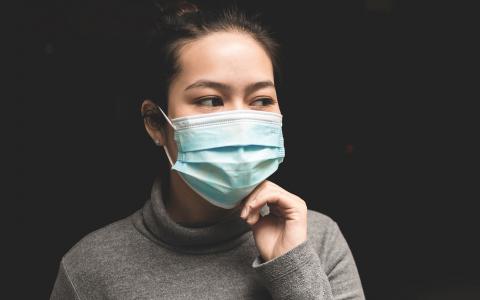
The new coronavirus (2019-nCoV) is now responsible for 77,658 confirmed cases in China, reported by the country’s National Health Commission on Monday, and confirmed cases of the strain in 23 countries outside China, according to the World Health Organization. As with any outbreak, global travelers have the risk of exposure on their minds — as evidenced by masks on their faces. Passing through any international terminal as of late, it’s impossible to ignore a sizable uptick in self-imposed muzzlings. They represent not just wary passengers but also airport staff, flight attendants and ground crew.
The practice remains unadvised by the Centers for Disease Control and Prevention: “CDC does not currently recommend the use of face masks among the general public,” reads the most up-to-date FAQ on the federal agency’s website. But that hasn’t stopped travelers from stocking up: Amazon is temporarily sold out of many of its top-selling disposable varieties; they’re easily spotted on faces in airports across the world.
How truly effective are masks, and when should people consider donning them? We queried a wide range of medical professionals on the matter to see what travelers should know in the wake of the outbreak.
A cover, but not a cure-all
“The regular kind of mask you’d find online is not all that helpful against any kind of virus,” warns Amy Shah, a double board-certified medical doctor in allergy and immunology. “Is it bad? No. It’s not like it’s harmful. But will it completely protect you? No. The best thing you can do is wash your hands frequently — with water and antibacterial soap for at least 20 seconds — and to keep your immune system up,” she says.
To that end, she offers disposable gloves as a more effective form of prevention when traveling than the stereotypical surgical mask. And as a more practical measure, she suggests assisting self-defense with lots of vitamin C in the form of food.
“Leafy greens are a great source, more so than eating a ton of oranges,” she says. “Turmeric and vitamin D also work as immune-boosters.”
One size doesn’t fit all
If you’re of the “better safe than sorry” camp, remember to consider a mask’s size and rating.
“N-95 masks, which are used by health-care workers, would be the most effective,” says Richard Seidman, the chief medical officer of L.A. Care Health Plan. “They are tighter-fitting and able to filter smaller airborne particles. Those found in drugstores don’t fit as well and can’t protect against viruses that might be expelled in a cough or sneeze.”
In a pinch, making sure the mask forms a tight seal around your nose and mouth is probably more important than the specific mask used.
Some scenarios warrant it
There are some situations when wearing a mask makes more practical sense than others. Patrick Sanchez, a health-care professional based in Sacramento, recommends masks for people who are already sick, rather than those worried about coming down with something.
“Most studies have shown masks to be of greatest benefit to those that are actually sick, helping to prevent them from spreading an infection to others,” he says. If you feel the symptoms of fever or a head cold, he recommends strapping one on.
Other instances may call for a face mask as well. If you’re around a lot of sick people, as are medical professionals, then it makes sense to wear one. It’s also of value for those susceptible to allergies or air pollutants; a mask is far more likely to ward off dust and pollen than airborne pathogens.
The Transportation Security Administration, for its part, has authorized its front-line personnel — who routinely come into close contact with the traveling public — to voluntarily wear surgical masks. And a spokesperson for Delta tells The Washington Post that the airline supports its employees’ choice to wear masks, even going so far as to provide them for Asian-based crews to use at their discretion.
Keep perspective: Consider the flu
Mark Mulligan, division director of infectious diseases and director of the Vaccine Center at NYU Langone Health, advises the average American traveler against buying a mask, because the virus is not circulating in the United States the way it is in China.
“Remember, so far, no American has died of nCoV,” he says, pointing out that only a handful of Americans were currently known to have developed nCoV infection. (The number was 11 U.S. cases as of Monday.) “In contrast, the current 2019-20 flu season has already seen 15 million Americans become ill with flu and 8,200 American deaths.”
The flu is a much bigger threat than coronavirus, for now.
He urges travelers to take into account the risk of the flu instead and take the appropriate steps for its prevention. Common-sense precautions and practices are far more instrumental in the prevention of seasonal respiratory viruses like influenza. Chief among them, according to Mulligan, include washing your hands often, cleaning and disinfecting frequently touched objects and surfaces, and getting the flu shot.
“I encourage everyone to get the flu shot this season as soon as possible,” he says. “It is very safe, but sadly, less than 50 percent of the U.S. population gets a flu shot each year.”
Don’t mask your best defense
Although the benefits of a mask are contentious, experts agree that the only definitive downside is a false sense of security.
“It’s frustrating, because you want the answer to be a supplement. But it’s really all about good sleep and stress control,” says Shah, the allergy and immunology expert. “In any sort of disease prevention, your own immune system is always the best weapon.”



